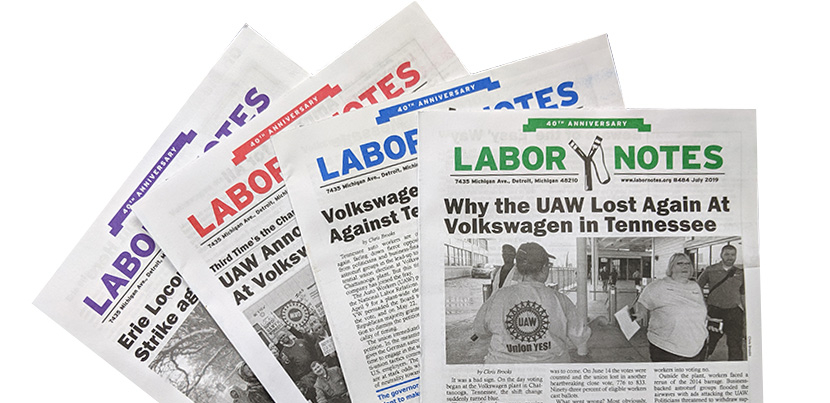RE
The definition of a quarterback on Monday morning is someone who always criticizes and tells how he would have done something better or different after the event has passed.

Labor Notes strives to be fair, and to deal with disagreements honestly. But we have a point of view. We always have. Photo: Saurav Sarkar.
Everyone loves a good story about an Amazon walkout. But when Labor Notes wades into more controversial waters—the pros and cons of a contract, for instance, or a race for union office—we can expect some angry letters.
“Let’s not criticize each other,” is a common refrain. “We get enough attacks from the boss! Airing disagreements gives ammo to union-busters.”
My answer: first of all, those fears are overhyped. Union busters hired to squelch organizing drives mostly play the classics, like “You’ll Get Fired and the Plant Will Close,” “It’s No Use—You Have No Power,” and “The Boss Loves You (Give Him Another Chance).” Debates within the union are inside baseball.
But even when employers do seize on a union’s real flaws as talking points, the union is vulnerable because the problem exists, not because we’re talking about it. How will we ever fix problems if we can’t discuss them?
Union busters are sure to make hay of the scandal that Auto Workers leaders allegedly took payoffs from employers. That doesn’t mean we should sweep this horrifying behavior under the rug.
Despite this principle, we’re sensitive to timing. In the recent union drive at Volkswagen, we held back our criticism of the organizing strategy until after the vote. We wanted the union to win despite its flaws.
But ultimately what helps the boss is a weaker labor movement that doesn’t deal with its mistakes—or an undemocratic movement that squanders potential participation.
Another complaint: “Easy for you to say! It’s not your union, and you’re not in the trenches, so who are you to criticize?”
If you think it’s nosy to take an interest in anyone’s contract but your own, then Labor Notes isn’t the magazine for you. We were founded 40 years ago with the express goal to help activists in different unions cohere together to demand more democracy and militancy across the whole labor movement.
That said, we’re not making this stuff up. We ground any criticism in what we hear from rank and filers. We didn’t gin up controversy over the New York State Nurses’ contract; we reported on it because it was real.
Our analysis of why the Volkswagen drive fell short was bound to leave organizers feeling stung. Nonetheless these conversations are important so that the labor movement can learn from mistakes and up our game.

Give $10 a month or more and get our "Fight the Boss, Build the Union" T-shirt.
Of course employers and anti-union groups are to blame for defeats. But it’s up to unions to figure out how to beat them.
One more: “This article is biased. Aren’t journalists supposed to be objective? You shouldn’t take sides.”
We strive to be fair, and to deal with disagreements honestly. But Labor Notes has a point of view. We always have.
We’re for member-run unions, action on the job, and solidarity across borders. We’re against concessions, racism, and partnering with the boss.
We don’t quote company bigwigs. We rarely even quote union bigwigs. Our focus is on the rank and file.
Sometimes it’s a snap to see where we should stand. Longtime readers aren’t surprised when Labor Notes criticizes Teamsters honchos and boosts Teamsters for a Democratic Union.
Other times it’s more complicated. In the recent contest for NewsGuild president, and in the New York Nurses debate, activists who identify with Labor Notes principles didn’t all see eye to eye.
In those articles we worked hard to include a variety of voices and to give readers an accurate portrayal of each side. That doesn’t mean we came down in the middle, or should.
We’re not neutral, but I’m proud that we are credible. We don’t fudge numbers or puff up failures. We delete empty rhetoric.
Read Labor Notes long enough and you’ll read something you disagree with—sometimes because we got it wrong. Please keep the letters coming, and keep us honest!
Write to us at editors[at]labornotes[dot]org
The definition of a quarterback on Monday morning is someone who always criticizes and tells how he would have done something better or different after the event has passed.